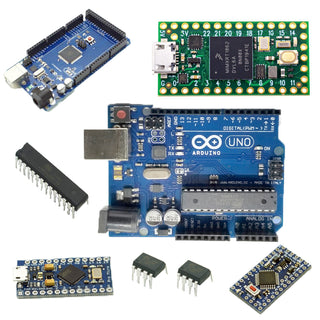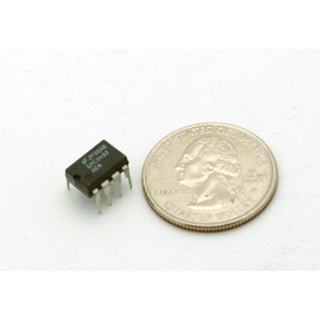LMC6492 Dual CMOS Rail-to-Rail Op-Amp 8-Pin DIP (D99D)
- Unit price
- / per
Dual CMOS Rail-to-Rail Op Amp – LMC6492BEM (8-Pin DIP)High-Performance Rail-to-Rail Operational Amplifier
The LMC6492 is a dual CMOS rail-to-rail operational amplifier specifically engineered for demanding analog applications that require precision, wide dynamic range, and robust performance over a broad temperature range. With its advanced input topology, this op amp provides a common-mode voltage range that extends beyond the supply rails, eliminating the risk of non-linear output errors caused by over-range input conditions.
Technical Specifications and Features
- Manufacturer Part Number: LMC6492BEM
- Package: 8-Pin DIP
- Amplifier Type: Dual CMOS Op Amp
- Input/Output: Rail-to-rail input and rail-to-rail output swing
- Supply Voltage Range: Single or dual supply operation; optimized for use in 5V systems
- Input Bias Current: Ultra-low, 150 fA (typical)
- Common-Mode Rejection Ratio (CMRR): 82 dB, supporting high-accuracy non-inverting circuits
- Open-Loop Gain: 120 dB
- Operating Temperature Range: -40°C to +125°C
Precision Design for Accurate Signal Processing
The LMC6492 is ideal for high-impedance sensor interfaces, transducer amplifiers, and instrumentation where low bias current and high accuracy are mission critical. Its wide common-mode input range and high CMRR ensure clean, accurate signal amplification—particularly important in precision applications and low-voltage designs.
Applications & Integration Guidance
- Suitable for direct interfacing with high-impedance sensors and sources
- Optimized for both single and dual-supply operation
- Engineered to maintain stability and precision across the full industrial temperature range
- Common in automotive, industrial control, instrumentation, and portable designs
Documentation
LMC6492 Dual CMOS Rail-to-Rail Op-Amp 8-Pin DIP (D99D)
- Unit price
- / per
Adding product to your cart
You may also like
Dual CMOS Rail-to-Rail Op Amp – LMC6492BEM (8-Pin DIP)High-Performance Rail-to-Rail Operational Amplifier
The LMC6492 is a dual CMOS rail-to-rail operational amplifier specifically engineered for demanding analog applications that require precision, wide dynamic range, and robust performance over a broad temperature range. With its advanced input topology, this op amp provides a common-mode voltage range that extends beyond the supply rails, eliminating the risk of non-linear output errors caused by over-range input conditions.
Technical Specifications and Features
- Manufacturer Part Number: LMC6492BEM
- Package: 8-Pin DIP
- Amplifier Type: Dual CMOS Op Amp
- Input/Output: Rail-to-rail input and rail-to-rail output swing
- Supply Voltage Range: Single or dual supply operation; optimized for use in 5V systems
- Input Bias Current: Ultra-low, 150 fA (typical)
- Common-Mode Rejection Ratio (CMRR): 82 dB, supporting high-accuracy non-inverting circuits
- Open-Loop Gain: 120 dB
- Operating Temperature Range: -40°C to +125°C
Precision Design for Accurate Signal Processing
The LMC6492 is ideal for high-impedance sensor interfaces, transducer amplifiers, and instrumentation where low bias current and high accuracy are mission critical. Its wide common-mode input range and high CMRR ensure clean, accurate signal amplification—particularly important in precision applications and low-voltage designs.
Applications & Integration Guidance
- Suitable for direct interfacing with high-impedance sensors and sources
- Optimized for both single and dual-supply operation
- Engineered to maintain stability and precision across the full industrial temperature range
- Common in automotive, industrial control, instrumentation, and portable designs
Documentation
You may also like
You may also like
Recommended products
Most orders arrive in 2-3 days
Our staff will go the extra mile to find your solution
A favorite of the Seattle area since 1989
PCI DSS compliant checkout



